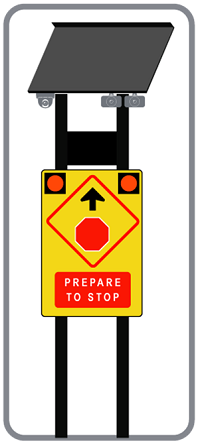Transport for NSW is trialling technology at three passive railway level crossings in regional NSW.
The trials are designed to improve safety by improving driver awareness of the level crossing and its risk.
There are more than 2,700 level crossings on operational lines on the NSW rail network. There are 1,360 level crossings on public roads and of these, 925 level crossings have a stop or give way sign.
Between 2001 and 2021, there were 164 crashes at level crossings between trains and road vehicles in NSW, resulting in 16 fatalities and 26 serious injuries.
During this period, the average frequency of collision at a level crossing in NSW was just over eight crashes per year, or one crash every six weeks.
The new technology is being trialled at three trial sites in regional NSW:
- Mary Gilmore Way, Bribbaree, LX1130 – Augmented Stop Signs and Advance Warning Signs, both with LED lights.
- Dandaloo Road, Narromine, LX1109 – Augmented Stop Signs with LED lights.

- Old Backwater Road, Narromine, LX1108 – Advance Warning Signs with LED lights.
New Technology
Advance Warning Sign – The advance warning signs with orange ‘wig wag’ lights will flash if an approaching motorist is not slowing down to prepare to stop at the level crossing. The warning sign system uses solar and battery power to provide reliability and resilience in regional conditions.
Augmented Stop Sign – The augmented stop signs have LED red lights constantly illuminated in daylight to increase driver awareness of the stop sign at the level crossing.

The augmented stop sign’s lights will flash during daylight if an approaching motorist is not slowing down to prepare to stop at the level crossing.
During the trial, the augmented stop sign lights will only operate in daylight. CCTV will monitor the performance of the system at each site.
The Augmented Stop Sign and Advance Warning Sign system use solar and battery power to provide reliability and resilience in regional conditions.



